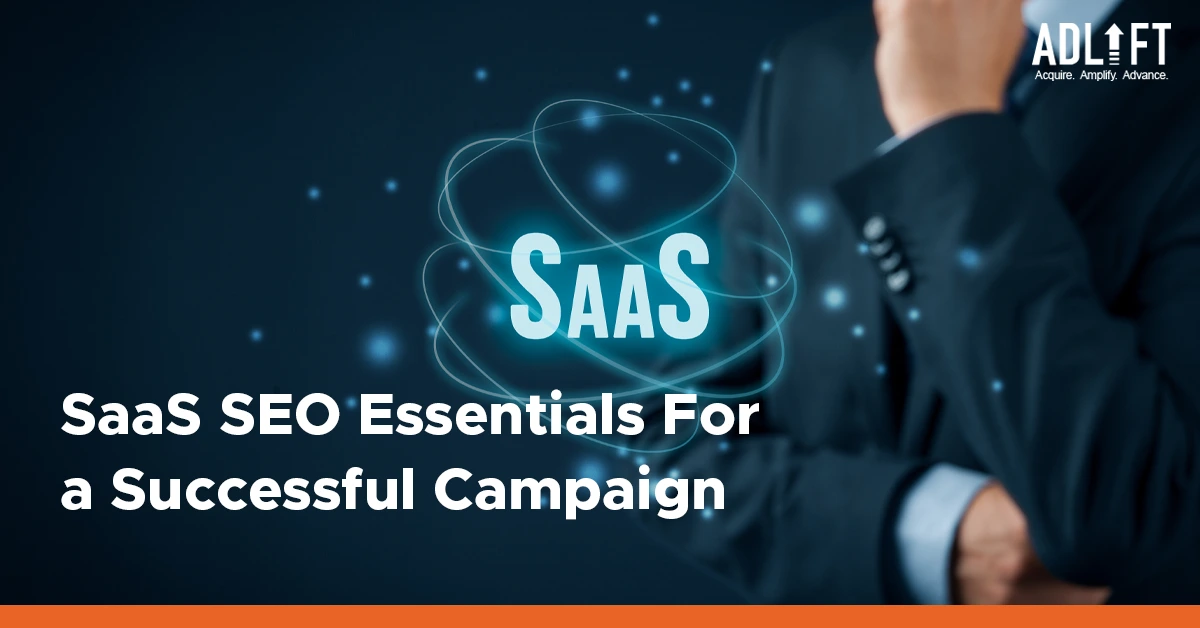SaaS SEO Essentials: Key Components of a Successful Campaign

Search engine optimization (SEO) is crucial to any marketing strategy. When it comes to the software company or SaaS SEO agency, a well-planned SaaS SEO strategy is a must. It can profoundly uplift website traffic and momentum user acquisition. However, with numerous variables involved in SaaS marketing SEO, it can take time to know where to start. In this blog post, we’ll go through the basics of a SaaS SEO strategy and the key elements of a successful SEO strategy for SaaS.
Keyword research
The starting point of any SaaS SEO strategy is keyword research. It is yet one of the basics of SaaS SEO strategy. It involves identifying the most relevant and high-traffic keywords your target audience is searching for. Optimizing your website for these keywords can increase the chances of appearing on the first page of search engine results pages (SERPs).
Several tools are available for keyword research to improve SEO strategy for SaaS. Google Keyword Planner, SEMrush, and Ahrefs are the best tools for SEO strategy for SaaS. These tools can provide insights into the volume of searches for particular keywords, as well as the level of competition for those keywords.
On-page optimization
The second major point in SaaS seo guide is on-page optimization. It includes optimizing the content on your website for the keywords you’ve identified. This includes optimizing the title tags, meta descriptions, and headings, as well as ensuring that your content is high-quality, engaging, and relevant to your target audience.
Other factors to consider in optimizing the website’s website speed are mobile-friendliness and user experience. Google considers these factors when ranking sites in search results, so it’s essential to ensure that your website meets Google’s standards.
Content Marketing
The SaaS SEO guide always talks about content marketing as it is an essential component of SEO for SaaS companies. By producing high-quality, informative, and engaging content, you can attract more visitors to your website, generate leads, and establish yourself as an authority in your industry.
The effective content for SaaS SEO agency includes blog posts, whitepapers, case studies, and infographics. When producing content, it’s essential to focus on topics relevant to your target audience and optimize your content for the keywords you’ve identified through keyword research. This is why content marketing plays an important role in SaaS marketing SEO.
Link Building
Link building is one of the essential points when we learn the basics of a SaaS SEO strategy. It is the process of acquiring links from other websites to your own. When a reputable website links to your website, it signals to Google that it is authoritative and trustworthy, which can improve your rankings in search results.
Several link-building strategies include guest posting, broken link-building, and outreach. Ensuring that any links you acquire are from reputable websites and relevant to your industry is essential.
Local SEO
The last point in our SaaS SEO guide is Local SEO, as a SaaS SEO agency must target customers in specific geographic location. SaaS marketing SEO involves optimizing your website and online presence for location-based keywords and ensuring your business appears in local search results.
Some strategies for local SEO include creating a Google My Business profile, optimizing your website for location-based keywords, and ensuring that your website is listed in local directories and review websites.
Conclusion
SEO is a critical component of running any SaaS SEO agency. By conducting keyword research, optimizing your website’s content and user experience, producing high-quality content, acquiring links from reputable websites, and focusing on local SEO, you can improve your website’s visibility in search browser results and attract more customers to your business. Incorporating these fundamental elements is critical to achieving a successful SaaS SEO campaign.
FAQs
SaaS SEO targets the marketing of subscription-based software products. It emphasizes trial sign-ups, user onboarding, as well as recurring revenue optimization. Moreover, it also focuses on conveying the software’s value proposition and seamless user experience, aligning strategies with the unique customer journey in the SaaS ecosystem.
To gauge the efficacy of your SaaS SEO campaign, monitor key metrics like organic traffic growth, trial sign-ups, conversion rates, and churn rates. Analyze user engagement through time spent on site and feature adoption. Utilize tools such as Google Analytics, user behavior tracking, and cohort analysis to assess long-term customer value and overall ROI, ensuring informed optimization decisions.
Common errors in SaaS SEO encompass neglecting user intent in keyword targeting, overlooking mobile optimization, ignoring on-page SEO, neglecting regular content updates, and underestimating the importance of backlinks. Failing to align SEO with product updates and disregarding competitor analysis can also hinder success. Strive for a holistic approach that combines technical excellence, user-focused content, and consistent adaptation to the dynamic SaaS landscape.
To enhance keyword rankings for your SaaS product, conduct thorough keyword research targeting user intent. Optimize on-page elements, such as title tags, meta descriptions, and headers. Develop high-quality, relevant content that addresses user needs. Earn authoritative backlinks through outreach and content promotion. Regularly monitor and refine your strategy based on data-driven insights, staying adaptable in a competitive SaaS market.
The timeline for results in a SaaS SEO campaign varies. Generally, initial improvements might surface within a few months, with more significant gains taking 6 to 12 months. Factors like competition, keyword difficulty, and your site’s authority influence the pace. Continual optimization is key; consistent efforts can yield sustained growth and increased visibility over time.
Optimizing your SaaS website for mobile users involves several steps. Prioritize responsive design to ensure seamless functionality across devices. Streamline content for quick loading, minimize large images, and utilize browser caching. Implement mobile-friendly navigation with clear CTAs. Test usability on various devices and screen sizes. Regularly update and test mobile performance to deliver a smooth, user-friendly experience that enhances engagement and conversions.
Backlinks hold significant importance in SaaS SEO. They contribute to your site’s authority and credibility, influencing search engine rankings. Quality backlinks from relevant, authoritative sources validate your SaaS product’s value, driving organic traffic and potential customers. A well-structured backlink profile enhances visibility and fosters trust among both search engines and users, ultimately boosting the success of your SaaS SEO efforts
Optimizing your SaaS website for local SEO involves targeted strategies. Include location-based keywords in your content, meta tags, and headers. Create a Google My Business listing with accurate business information. Encourage customer reviews and ratings. Build local citations on reputable directories. Leverage structured data markup to enhance local search visibility. Participate in local events and engage with the community to establish a strong local online presence for your SaaS offering.
Leverage content marketing to bolster SaaS SEO by creating valuable, informative content. Develop blog posts, whitepapers, and tutorials addressing user pain points and industry trends. Integrate relevant keywords naturally, optimizing for both search engines and user experience. Share content across social platforms and engage with your audience. High-quality, shareable content enhances organic visibility, attracts backlinks, and establishes your SaaS brand as an authoritative resource, amplifying your SEO efforts.
Categories
Recent Posts
- Understanding Google’s December 2024 Core Update: What to Expect December 17, 2024
- Optimizing For Google AI Overviews: What Marketers Need To Know November 19, 2024
- Google’s Latest Shake-up: November 2024 Core Update November 13, 2024
- SEO Ranking Explained: Proven Techniques to Enhance Your Website’s Traffic October 22, 2024
- The Importance of Mobile SEO Optimization: A Guide to Staying Competitive October 16, 2024
- What is Evergreen Content? Build Traffic That Never Fades October 15, 2024
- The Role of Technical SEO Elements in Enhancing Site Performance and Rankings October 10, 2024
- Customer Acquisition 101: Building a Loyal Client Base October 10, 2024
- How User Experience Directly Impacts SEO Rankings: Key Factors to Consider October 8, 2024
- Core Web Vitals and SEO: How to Optimize for a Faster Website? October 3, 2024
Get
in Touch
Contact AdLift for a 360-degree marketing plan


